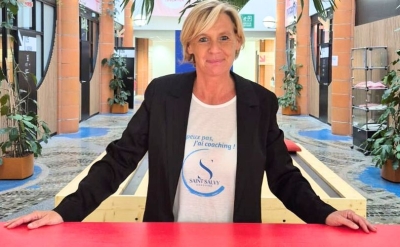News

Our Incredible Life Paths - Jean-Michel BARTHEZ (TBS 2006)
Why did you choose Toulouse, and TBS, to study?
When I was nearly 40, and after 15 years in R&D in the materials and automobile field, I wanted over. I lived in Haute Normandie (Eure) at the time, and spent my time travelling for both personal work-related reasons.
My goal was to be in the Montpellier area where my daughters and their mothers lived, as did my partner.
I already had a doctorate, and wanted to focus on getting a Diploma of Excellence, such as an MBA. There were three possibilities in the location I wanted to be for family reasons:
- EM in Lyon;
- Euromed in Marseille; and
- TBS in Toulouse.
I finally settled on TBS for three reasons:
- It’s specialties and the specificity of the Aeronautics MBA;
- The responsiveness of the team in charge of the program; and,
- Despite it didn’t have a TGV line, it was close to Montpellier.
Would you tell us about your time as a student at TBS?
It was an incredible year!
- The welcome was top-notch from the first day with a “Teambuilding” session in Moissac;
- The team was multi-cultural and international, made up of 27 “delegates” (Chinese, Russian, Indians, Omani, Ukrainian, Canadian, American, Colombian, German, English, French, and others); and,
- It had a dedicated and comfortable room on the top floor with access to a terrace (which was great for taking breaks, and overlooked the A380 test field); and,
- It had a devoted team led by Jacques Tournut, who left his mark on the program for more than 15 years.
Do you have any anecdotes from your graduating class to share? (Student associations, projects, professors, etc.)
There are so many stories about multiple people and the different private events organized by several class members (meals, picnics, outings in the snow), or about the different events organized by the program (particularly a trip to Paris during the 2005 riots!). One of the delegates had a health emergency which required an urgent operation. He had more than 50 years, and had returned to a high-level post in Finance and Accounting and in the Seattle area.
Who are you today?
In what perspective did you enter the labor force after you got your degree? What were your motivations?
There were some difficulties in the beginning, such as the Airbus crisis related to problems of the industrialization of the A380, a Class patron (a patron of Airbus France at the time) was difficult to meet, a network that needed to be reconstructed. But thanks to TBS and to the MBA that I had gotten in 2006, I was able to participate in the November 2006 Aeromart 2006 in Toulouse and meet my future manager.
Very motivated by the achievement of my new "door opener", I was offered an opportunity to work for a subsidiary of Airbus, as a PLM specialist (one of the sectors I planned to work in) in charge of Design to Cost support. Despite the theoretical and practical contribution of the MBA on this subject, and even though I had sent about thirty CVs sent and had had about ten interviews, it took me about six months to get a firm offer. The Alumni network was very valuable, as well as were some faculty members of TBS.
What are you currently doing?
I still work at CIMPA (it’s been more than 12 years now) which was sold to the Sopra-Stéria Group in 2015. The Airbus group, more specifically the civil aviation business, remains our main customer (> 80% of our turnover) despite our major efforts to break into other areas (transport and energy) in France and Europe.
The transnational business is still very connected to our business with Airbus (in Germany, the United Kingdom, Spain, and France).
I’m a PLM consultant in information systems (IS / IT) with regular support activities related to the different PLM programs at Airbus.
I’ve also been a host of the training union since the beginning of 2019 (18 to 20 days a year).
Why did you choose this career, this job?
On the PLM side, it’s because I have a curious mind, as well as the complexity of the field that goes from the "drawing" to the in-service follow-up of each aircraft.
As for the training side, it became my main objective to reconcile the useful with the enjoyable until the end of my career. My bachelor degree was in training and my master's degree was in physical sciences, which prepared me for teaching competitions (CAPES, Aggregation). And I was an assistant educational instructor at the university, and in my first jobs in the industry.
At what moment did you know that this path was made for you?
I realized it about two to three years ago when things had fallen into a routine, my tasks didn’t add much value, and there were no intellectual and technical challenges.
How did you get to where you are today in your career? (The major steps to consider.)
First of all, finishing my PhD, which was and remains an important challenge at the end of your university studies. And then finding job in a country where this level of study (other than at a University and some “grandes écoles”) is recognized. An engineering degree and the network of engineering schools and business schools are much better geared towards industry than those of universities (as a general rule).
Understanding the business world and entering into it with proposals and initiatives that were in line with the company’s objectives, or in the project in which I was invested.
Then time came where I knew what my career ambitions were and I needed recognition, which gave me the chance to direct of a team of engineers at one of my employer's clients who specialized in numerical simulation.
How did your studies help you reach your personal and / or professional achievements?
I was able to live in a new environment, in a large and beautiful city near my family, and work for a subsidiary of a large Aeronautics company that specialized in PLM.
For five years, I used my knowledge and the new skills I acquired while getting my MBA, to benefit a new aeronautical program focused on an economic analysis of the manufacturing costs of aeronautical components and sub-assemblies.
I met a person and rebuilt a new family. I’m now the father of a young son (who is now 10 years old) and two older daughters.
Where do you see yourself in ten years?
In 10 years, I’ll be 63 years old. I plan to keep on teaching in Europe, Asia, or North America. I’ll focus on subjects in aeronautics, in particular in aircraft manufacturing, but also in anything related to information systems and digital transformation, which is currently booming in industrial sectors.
 1
1














No comment
Log in to post comment. Log in.